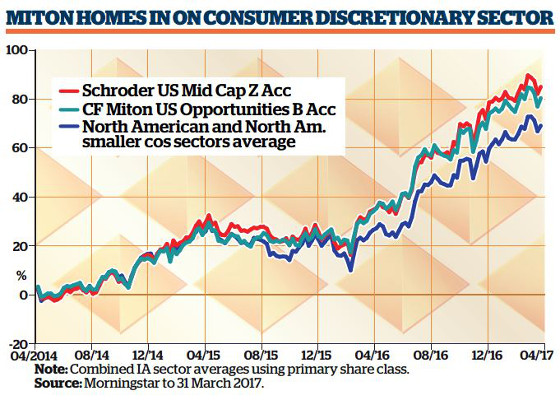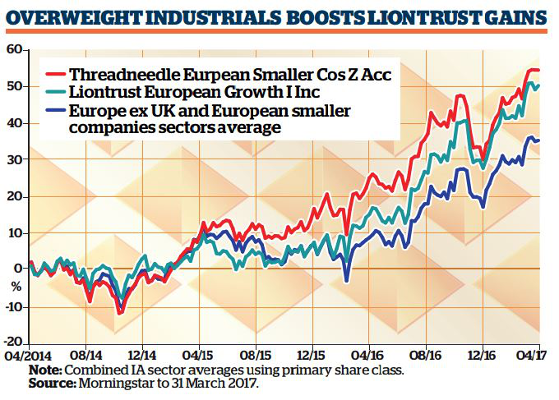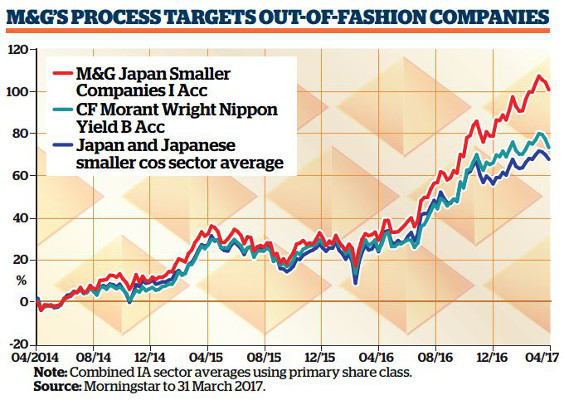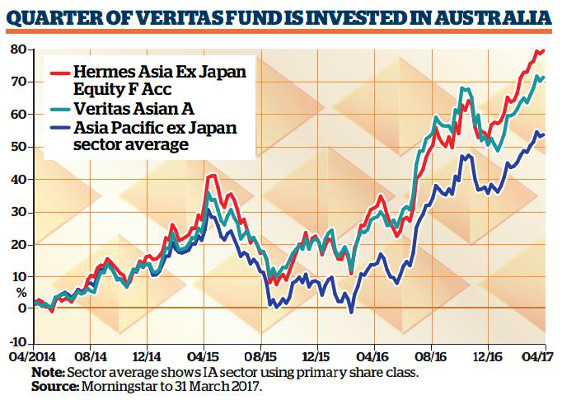Best regional funds of 2017
14th July 2017 09:12
by Andrew Pitts from interactive investor
Share on
Best North America fund
CF Miton US Opportunities
1-year return: 35.8%; 3-year return: 79%
Managed by Hugh Grieves and Nick Ford since its 2014 launch, the fund also took the title of Best North America fund in our awards last year, after achieving highly commended in 2015.
North America was a tough category this year; the region has been firmly in the spotlight since the US election, with optimism around the new president sending the stockmarket soaring. Grieves and Ford try to keep the focus on stock-picking for this fund, however.
They invest in 42 companies chosen from the Russell 3000 index, seeking out those with a competitive advantage in the products or services they offer. They believe these are the firms that have regular and growing cash flow, and that they are more likely to deliver than businesses that are developing new products or relying on one-off events. Among their biggest holdings are home fixtures manufacturer and hotels group .
Almost a quarter of the fund's £274 million of assets is invested in the consumer discretionary sector, with IT the next biggest weighting at 21.8% of the portfolio.
Grieves and Ford do keep an eye on macro trends, however, and will avoid entire sectors if they think they are at risk of a setback. The duo say that stronger corporate earnings results have boosted investor sentiment in recent weeks, but lower-than-expected job creation numbers and a spike in the oil price have been disappointing.
Highly commended North America fund
Schroder US Mid Cap
1-year return: 39.9%; 3-year return: 84.3%
Jenny Jones has managed the fund since it was launched in 2005, and now has more than £1.9 billion under management. The fund, which was a 2014 winner and highly commended in 2013, keeps at least 70% of its money in medium-sized American businesses.
New York-based Jones has a fairly cautious approach; she is currently underweight on financial services and materials companies, overweight healthcare and consumer discretionary stocks and positive about the outlook for the housing sector. There are 113 holdings in the portfolio, the largest of which include , which provides facilities and uniforms to organisations such as hospitals and universities, and laboratory supplier .
Jones has a flexible approach and responds rapidly to any economic changes; she looks for a mix of mispriced growth stocks, 'steady eddies', and businesses on the brink of a turnaround.
The fund is a top-quartile performer over both one and three years, having produced returns of 39.9% and 84.3% respectively over those periods.

Best Europe fund
Liontrust European Growth
1-year return: 30.3%; 3-year return: 49.1%
James Inglis-Jones has managed the fund since its launch in 2006; he was joined by co-manager Samantha Gleave in 2012, although the pair first worked together back in 1998. They now have £134.6 million of assets under management.
Inglis-Jones and Gleave run the fund according to Liontrust's cash flow solutions strategy; they believe that a company's cash flow is a more reliable guide to its future profitability and its share price than anything else. The process aims to help managers avoid paying too much attention to financial forecasts made by company management, which can be prone to errors.
Instead, the duo focus on a firm's cash flow relative to its value and to its assets; they hope to find undervalued companies that can allocate their money in an intelligent way and grow over the long term.
The fund invests in companies across developed Europe; currently it is overweight Sweden, with 17.8% of the fund in the region compared to just 6.4% for the benchmark (the MSCI Europe ex UK index), and are underweight France, which accounts for just 5.8 % of assets compared to some 22.7 % of the benchmark. The biggest sector overweight position in the fund is in industrials, which account for 22.6% of the portfolio.
Some of the fund's largest holdings include Swiss cosmetics company Oriflame, Nordic construction firm Peab, and ferry operator DFDS.
Companies are ranked and analysed by the team after they publish their accounts, and any news related to companies in the portfolio is carefully monitored, as are any quarterly or other financial results and news on events such as acquisitions or shareholding changes.
Highly commended Europe fund
Threadneedle European Smaller Companies
1-year return: 24.1 %; 3-year return: 52.8%
Mark Heslop joined Threadneedle as a smaller companies analyst and took the helm of the in 2013; the fund now has some £1.8 billion of investors' money under management. It is a top performer in its small peer group, which consists of just 25 funds, and has returned 24.1% over the past year and 52.8% over three years.
Threadneedle European Smaller Companies focuses on businesses which have a smaller market capitalisation than the top 225 companies in the FTSE World Europe Index, and it can also back firms which aren't based in Continental Europe but have a significant part of their operations there.
The fund's greatest regional weighting is to French equities, which make up 16.3% of the portfolio, with German, Italian and Swedish companies the next biggest allocations within the fund.
Heslop is overweight industrials, healthcare and consumer discretionary stocks but underweight on real estate and energy companies.

Best Japan fund
M&G Japan Smaller Companies
1-year return: 53.3%; 3-year return: 100.4%
The £216.7 million was launched in 1984 and has officially been managed by Johan Du Preez since 2015, though he was part of the team that managed it previously.
Du Preez is looking for companies whose share price he believes does not reflect their sustainable earnings over the long term. With a strong smaller companies focus, he has at least 80% of the fund in the businesses which make up the bottom third of all publicly listed companies in Japan by market capitalisation.
A Money Observer Rated Fund for the past two years, M&G Japan Smaller Companies has a mandate that allows it to invest some money in medium and large companies if necessary and to use derivatives to reduce risk or costs. Du Preez says he uses disciplined analysis of the fundamentals of a stock to make sure he has a high conviction in the companies he backs - currently there are just 39 stocks in the portfolio.
Du Preez thinks stocks can often be mispriced because they are out of fashion, even if the company has strong fundamentals such as a healthy balance sheet and sustainable earnings. He says behaviour biases such as fear or greed often stop investors from making rational judgments. His process frequently leads him to out-of-favour companies; the fund's largest holdings include graphic tablet maker Wacom and online fashion retailer United Arrows.
The fund is comfortably within the top quartile of its group over the past 12 months, and would have doubled investors' money over the past three years. Du Preez says structural changes in Japan can provide sustainable returns over the long term for investors who are not afraid to sail into the headwinds.
Highly commended Japan fund
CF Morant Wright Nippon Yield
1-year return: 35.9%; 3-year return: 73.2%
A Money Observer Rated Fund since 2013, this is the first time has made it into our awards roll of honour, taking the Highly Commended Japan gong. We like the fund group's pure focus on investing in Japan and the fact that it is one of the few Japan funds available that aims to deliver income - it currently yields 2%.
The team of six, led by company founders Stephen Morant and Ian Wright, say they are value investors who also aim to preserve capital. When choosing their investments, of which there are currently 66 in the portfolio, they start by looking at the company balance sheet, including key measures such as operating profit and ratios such as price to book value. They are looking for companies with the potential to grow over the long term without undue risk.
The fund's largest holdings include Mitsubishi Financial, and construction company Kyowa Exeo. The team say increasing interest from private equity investors is helping to highlight the value in Japanese companies.

Best Asia Pacific ex Japan fund
Veritas Asian
1-year return: 34.5%; 3-year return: 70.8%
Highly commended for the past two years, has this year taken the top spot as Best Asia Pacific ex Japan fund. The fund has seen its assets under management grow by almost £100 million over the past year, to £444.4 million.
The investment team, led by Ezra Sun, is split between London and Hong Kong, but the colleagues communicate daily to discuss ideas and put decisions into action. The team split the portfolio into two parts. The core is focused on long-term investing, picking those companies expected to provide a steady return over the next three to five years.
But there is also a trading element to the portfolio, which is much more focused on the short term; this part of the fund aims to take advantage of inefficiencies in the market and earnings momentum.
The team also use a thematic approach to make their portfolio choices, considering the business model, quality of management and sustainability of a business, with a focus on how much free cash flow the company has.
Currently a quarter of the portfolio is invested in Australian companies, with a further 20.7% in China and 13.2% in India. In terms of sectors, the biggest weighting is to IT, which accounts for 22.3% of assets, with financials making up 18.9% of the portfolio. The fund can invest in companies of any size but typically has a bias towards larger firms.
The past 12 months haven't been the fund's strongest - it ranked in the third quartile of its peer group - but it is a top performer over the longer term, having returned 70.8% over three years.
Highly commended Asia ex Japan fund
Hermes Asia ex Japan Equity
1-year return: 35.8%; 3-year return: 80%
The fund won our award last year, but this year it slips into second place, taking the title of Highly Commended Asia Pacific ex Japan fund; it has also made it onto our Rated Funds roll call.
Jonathan Pines has managed the fund since its 2012 launch and now looks after some £2.4 billion. Taking a contrarian approach, he says he looks for quality deals rather than quality companies.
He wants to make gains if he is correct about a stock and make sure losses are kept to a minimum if he makes a wrong call.
The fund has some 40% of its portfolio in China and a further 35% in Korea; there are 57 holdings and the top 10 investments account for more than 37 % of assets. Pines is overweight on the consumer discretionary sector, with e-commerce company and outdoor clothing manufacturer Youngone featuring among his largest holdings.

This article is for information and discussion purposes only and does not form a recommendation to invest or otherwise.The value of an investment may fall. The investments referred to in this article may not be suitable for all investors, and if in doubt, an investor should seek advice from a qualified investment adviser.
This article was originally published in our sister magazine Money Observer, which ceased publication in August 2020.
These articles are provided for information purposes only. Occasionally, an opinion about whether to buy or sell a specific investment may be provided by third parties. The content is not intended to be a personal recommendation to buy or sell any financial instrument or product, or to adopt any investment strategy as it is not provided based on an assessment of your investing knowledge and experience, your financial situation or your investment objectives. The value of your investments, and the income derived from them, may go down as well as up. You may not get back all the money that you invest. The investments referred to in this article may not be suitable for all investors, and if in doubt, an investor should seek advice from a qualified investment adviser.
Full performance can be found on the company or index summary page on the interactive investor website. Simply click on the company's or index name highlighted in the article.